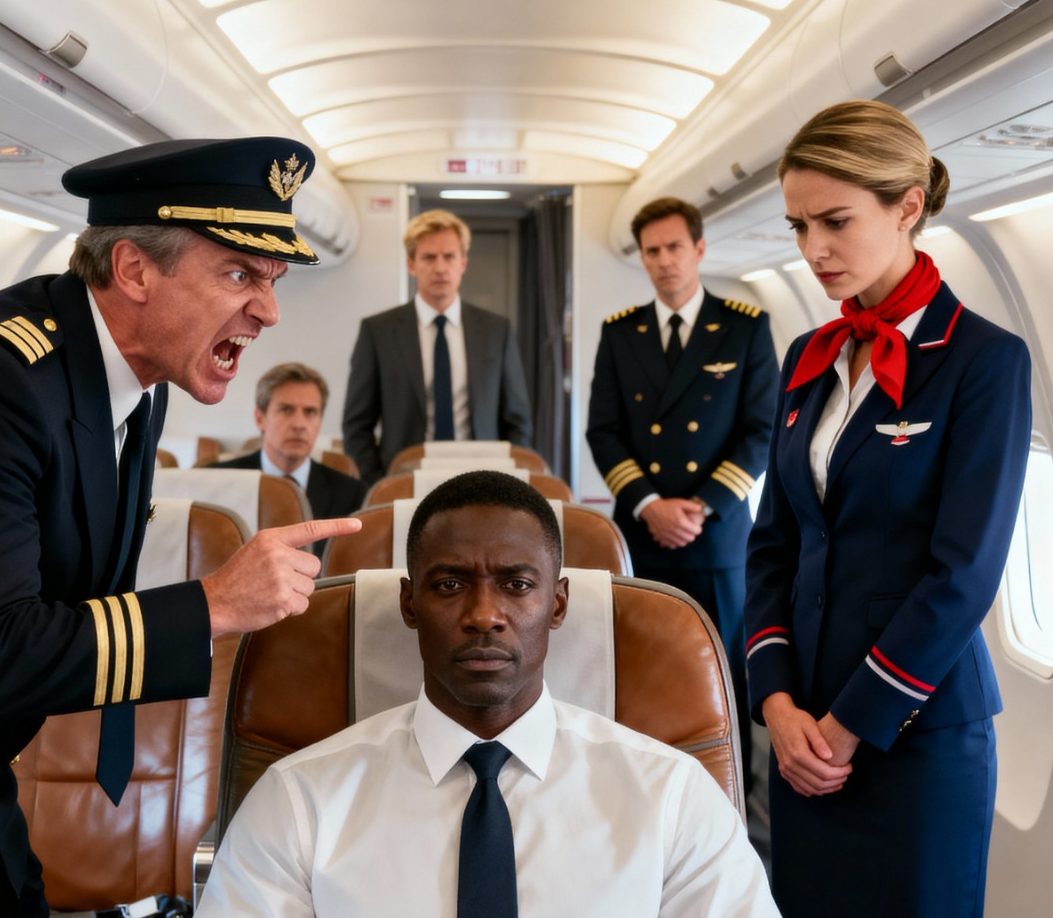Malcolm Reeves adjusted the cuffs of his shirt before stepping out into the curtain of London rain. Heathrow buzzed around him — hurried passengers dragging suitcases, announcements echoing overhead — yet he moved calmly, almost gliding through the crowd. The taste of victory still lingered on his tongue. The night before, he had signed the contract that could usher in a new era for Reeves Global Consulting. Years of hard work, nights spent under the glow of a monitor, and now — finally — he stood at the top.
The trip to Zurich was just a formality: a final meeting with partners and an interview for a prestigious business magazine. Malcolm decided to reward himself. First class. A rare moment of luxury, dignity, and quiet.
Boarding went smoothly. The flight attendant greeted him with a warm smile, and he returned it politely. But as he walked past the cockpit, a deep voice stopped him.
“Excuse me, sir,” said the captain — a man in his fifties with graying temples and cold blue eyes. “Economy class is in the back.”
Malcolm paused and calmly lifted his boarding pass.
“I’m aware. 2A, first class.”
The captain looked him over, then allowed himself a thin smile.
“Not a common sight up here,” he murmured — quietly, but loud enough for the stewardess to hear.
Malcolm didn’t respond. He simply nodded and continued on. The crew looked visibly uncomfortable.
His seat was spacious — white leather, soft music, a faint scent of champagne. In the next seat sat a Swiss bank executive who offered a curt nod before returning to his laptop. Malcolm opened his tablet and reviewed documents, pretending nothing had happened.
The flight began smoothly. The crew remained polite, but the tension in the cabin was palpable. The captain stepped out of the cockpit several times, each time throwing Malcolm a cold, assessing glance.
Halfway over the English Channel, a strange sound rippled through the plane. The lights dimmed, the engines produced a muffled rumble. The aircraft shuddered, and then the intercom crackled to life:
“Ladies and gentlemen, we’ve detected a minor technical issue. Please remain calm and keep your seatbelts fastened.”
A quiet murmur spread through the cabin. Malcolm glanced up and noticed one of the flight attendants staring at the captain, pale and anxious.
“Is this serious?” Malcolm asked softly.
“The captain says it’s nothing,” she replied, though her voice betrayed doubt.
The plane suddenly dropped. People screamed; a child began to cry. Glasses rattled, an overhead bin snapped shut on its own.
Then the captain’s voice again:
“Just turbulence, everything is fine.”
But his tone was tight, strained — anything but reassuring. Malcolm felt something was wrong. He unbuckled his seatbelt and moved toward the cockpit. The door wasn’t fully closed. He heard the captain snap at the first officer:
“That’s why I don’t trust people like that to run companies, countries, or cockpits. They only cause trouble.”
Malcolm froze. He understood exactly what “people like that” meant.
“Captain,” he said quietly but firmly, “if there’s a problem, I can help.”
The man turned; his eyes flashed.
“Sit down. This isn’t your place.”
The aircraft lurched again, a high-pitched alarm blared. The first officer was panicking, struggling with the controls. Malcolm stepped forward.
“Let me help,” he said. “I’m an engineer. I know these systems.”
The captain, red with anger, shouted:
“Back to your seat!”
But at that moment the plane tilted sharply, and Malcolm instinctively grabbed the controls. The first officer, realizing the gravity of the situation, didn’t resist.
“Left wing up! Stabilize altitude!” he shouted.
Slowly, the aircraft began to level out. The alarm fell silent. The first officer corrected the course, and the situation settled. The captain sat on the floor, his face twisted by a mixture of fury and fear.
Silence descended on the cabin. Malcolm leaned toward the captain and said quietly:
“Now you know the worth of the man you looked down on.”
When they landed in Zurich, airport security was already waiting. The captain was suspended immediately; an investigation began. The story spread worldwide: “Passenger Saves First-Class Flight.” Malcolm, however, refused interviews.
The next morning, in his hotel, he received a message from the airline’s CEO:
“Mr. Reeves, we sincerely apologize. You saved hundreds of lives.”
Malcolm replied with just one sentence:
“The danger wasn’t in the air — it was in the prejudice.”
He put on his suit and headed to his meeting, knowing that the real victory wasn’t survival — it was proving that a person’s worth is not defined by the color of their skin.
